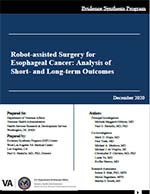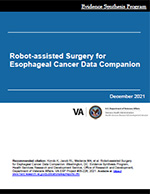
|
Prepared by: Recommended citation: |
Download PDF: Complete Report, Executive Summary, Report, Appendices

This report, through analysis of VHA administrative and registry data, augments the findings from the 2020 ESP systematic review of the published literature on robot-assisted minimally-invasive esophagectomy compared to other surgical approaches.
Systematic review of the literature comparing robot-assisted minimally-invasive esophagectomy (RAMIE) to other video-assisted minimally-invasive esophagectomy (VAMIE) and open esophagectomy (OE) for cancer revealed that no strong conclusions can be made about the appropriateness of RAMIE compared to other techniques. Additional randomized data or well-designed prospective matched studies with sufficient follow up time are needed to understand the utility of the robotic platform for esophagectomy for cancer.
Esophageal cancer is the 7th most common cancer diagnosis globally each year, and esophagectomy is an important component of esophageal cancer treatment. In 2016, over 1,800 robot-assisted esophagectomies were performed worldwide, a 9-fold increase from 2009. The purpose of this systematic review is to help clinicians, patients, and policymakers better assess the appropriateness of RAMIE versus VAMIE and open esophagectomy for esophageal cancer.
Overall, studies were heterogeneous regarding patient/tumor factors and surgical approaches. Therefore, strong conclusions cannot be made. In general, RAMIE is associated with longer OR times compared with VAMIE and OE. Lymph node harvest may be greater with RAMIE. There were no differences in blood loss between RAMIE and VAMIE. Conversely, blood loss was higher for OE compared to RAMIE. Short-term outcomes are mostly similar between RAMIE and VAMIE. Total and pulmonary complications may be fewer with RAMIE compared to OE. RAMIE may have a shorter length of stay compared to OE based on an analysis of U.S. studies only. There is a paucity of studies reporting long-term outcomes. Cancer recurrence is similar between RAMIE, VAMIE, and OE. However, cancer-free survival may be longer with RAMIE compared to VAMIE based on 1 RCT. Conclusions regarding cost could not be determined due to sparse data.
Mederos MA, de Virgilio MJ, Shenoy R, et al. Comparison of Clinical Outcomes of Robot-assisted, Video-assisted, and Open Esophagectomy for Esophageal Cancer: A Systematic Review and Meta-analysis. JAMA Network Open. 2021;4(11):e2129228. DOI: 10.1001/jamanetworkopen.2021.29228.
Systematic Review: Robot-Assisted Surgery for Esophageal Cancer: Analysis of Short- and Long-term Outcomes (Management eBrief)